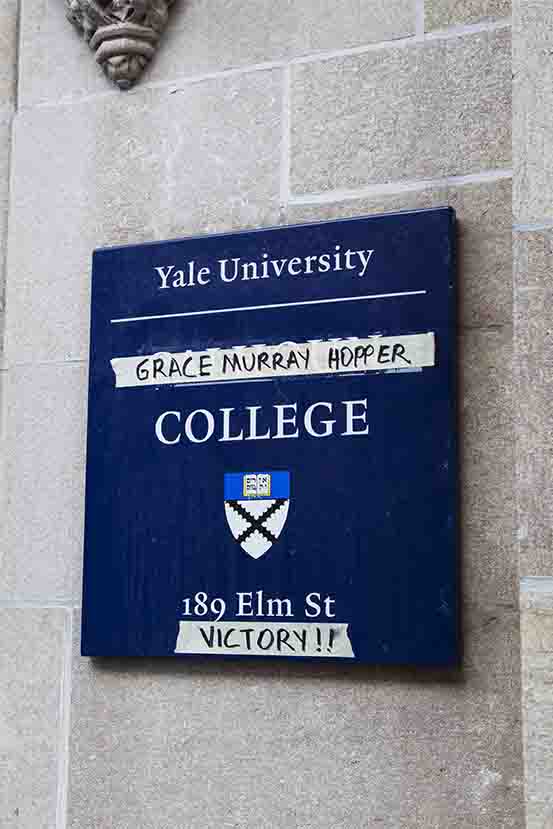
Nearly a full semester after Yale established a systematic process for evaluating renaming requests, no one at the University has submitted a building name for review, according to Vice President for Student Life and University Secretary Kimberly Goff-Crews.
In December, after the Committee to Establish Principles for Renaming released a report calling for administrators to weigh a namesake’s “principal legacy” against Yale’s mission, the University announced a four-step process for applying the principles to specific renaming requests. But even as some students and alumni have raised concerns about other buildings on campus, no one in the Yale community has submitted a formal request to the Office of the Secretary.
In interviews with the News, students and faculty said the Yale community has largely moved on from the naming debates of the last year, as other pressing issues — from reading period to presidential politics — take center stage on campus.
“It’s a good thing to have a process in place. We have laws for guidance, though we may not need them, hopefully, in our daily lives,” said Jay Gitlin ’71 MUS ’74 GRD ’02, a history professor who teaches the popular seminar “Yale and America” and is known as the unofficial historian of the University. “I think the intention was for this to bring the discussion to a close, at least for now.”
According to the procedure announced in December, anyone can submit a written renaming request to Goff-Crews, who would forward an application that is “thoroughly researched and well-documented” and meets administrative requirements to University President Peter Salovey. After that, Salovey would consult with his cabinet, which consists of the provost, vice presidents and academic deans, to determine whether the request merits further review.
If the request passed that hurdle, Salovey would appoint a single expert or a group of advisors — potentially similar to the three-person task force that was charged with applying the renaming principles to the specific case of Calhoun — to produce a recommendation on the name in question. Finally, Salovey would relay the recommendation to the Yale Corporation, which has final decision-making authority over renaming issues.
Despite the announcement of that protocol in December, many students, including Kiki Lobben ’20 and Hal Reichard ’19, do not know that a renaming procedure even exists or only vaguely remember hearing about it last semester. “Maybe Yale could have sent out more emails sharing information … about how to submit these requests,” Richard said. “I had forgotten about it.”
But the majority of students interviewed did not cite ignorance of the new procedure as the primary reason that Yale has yet to receive a renaming application. Nyamal Tuor ’20 noted that last year’s discussion was part of a sweeping national movement that has begun to fade in recent months.
“There was a lot of energy last year, but this year there’s not that much,” Tuor said. “There’s not really as much happening nationally as there was last year.”
Still, in recent months, some students, faculty and alumni have expressed concerns over the Schwarzman Center, named after Stephen Schwarzman, who donated $150 million to Yale in 2015 and now serves as an adviser for President Donald Trump. Earlier this semester, stickers appeared on bulletin boards around campus featuring a photograph of Schwarzman and Trump sitting together in matching red ties, with the caption, “What is Stephen Schwarzman’s ‘Principal Legacy’?” But no request to rename the Schwarzman Center has been submitted to Yale.
Reichard said he was aware of the push to rename the Schwarzman Center, but expressed doubt that Yale would ever move to rename those buildings.
Ho Kyeong Jang ’17 attributed the dearth of renaming submissions to general exhaustion following the years of activism that led up to the renaming of Calhoun College.
“The principles were pretty clear on who was eligible for renaming,” Jang said. “It had to be someone as bad as Calhoun. I can’t think of anyone — I think no one really knew anyone as bad as Calhoun.”
Jang added that the release of the renaming report coincided with a series of “political disappointments” for much of the Yale community. In the aftermath of Trump’s election victory, many students took to the streets to protest the new presidential administration.
Calhoun will be formally renamed in honor of pioneering computer scientist Grace Murray Hopper GRD ’34 on July 1.








